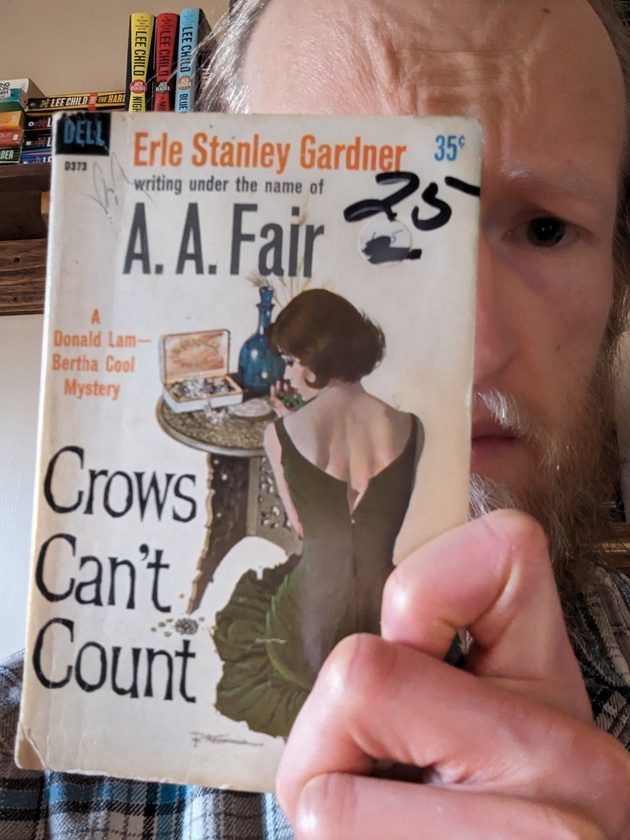It was April, 1946 and Syria gained independence from France, Jackie Robinson debuted with the Montreal Royals, and The Three Stooges were making America laugh again. Meanwhile, prolific novelist Erle Stanley Gardner had yet another mystery hit the shelves, under the pseudonym A. A. Fair.
Crows Can’t Count is the eleventh Cool and Lam mystery by the author best known for Perry Mason. Having read a couple of each, I’d never guess they were written by the same man. The Mason stories are written almost like screenplays, in that readers never know what a character is thinking or feeling. Our sole insights come from their physical or verbal expressions, and it’s so skillfully done only the most attentive readers may notice.
The Cool and Lam stories are written in the first person from the perspective on Donald Lam.
As the cover art of these novels suggest, the content is a little spicier than the more staid Mason mysteries, which isn’t to say they’re trashy. Maybe by 1940’s standards. But by those of today they’re pretty tame. The sexpot heiress in Crows Can’t Count doesn’t do anything more than give Lam a kiss.
It’s just implied that if she wanted to, she’d do much more.
The story opens with a new client, Harry Sharples, coming to the detective agency and hiring them to find out why his ward, Shirley Bruce, sold an emerald pendant rather than coming to him for money. If she needed cash her trust fund would supply it, though her co-heir Robert Hockley, would also get a bump in his allowance and he likes to play the ponies too much. Bertha Cool sees an easy payday, but it’s Lam who’ll end up doing most of the work.
They sort things out pretty easily. And then things get complicated.
Sharples shares his responsibilities with Robert Cameron (yes, two Roberts) and it seems he helped Shirley sell pendant. Which is odd, because Shirley adores her “Uncle” Harry and isn’t quite as fond of Cameron. Rather than ask Shirley directly, Sharples wants to confront Cameron and wants Lam to come along as witness. And that’s when they find Cameron.
Dead.
As you’d expect, there’s a whole tangle of lies to sort through and Lam has to work around distractingly attractive women, an angry Latina mother who throws knives when she thinks her daughter gave her poisoned candy, and conniving old men. Bertha's avarice and bombasticity, as always, also provide some hurdles. But what makes this story a little different is that it also takes Lam to Columbia (which at this time was known for emeralds, not drugs), where he has to deal with the language barrier and a government that operates like a cartel (so some things haven’t changed).
Oh, and there’s a sneaky crow that likes shiny things and can’t count.
Ironically, this is the second murder mystery I’ve read in a row where an unusual animal plays a key role in figuring out whodunnit. But I appreciate that at this time authors weren’t interested in clever kills like aspiring slasher movie killers, and preferred to focus on clever complications for their detectives. Also noteworthy is how these characters seem to have no lives away from their work. No dead mothers haunting their memories, or kidnapped sisters to find. No soap-opera throughlines.
These are stories from simpler times, and they reflect that.
All in all, I enjoyed the mystery quite a bit. Lam’s narration isn’t as witty as Archie Goodwin’s (whose is?), but the legal complexities Gardner is known for require a more somber voice. And even though the book is nearly 80 years old, I never at any point saw where it was going. If I see any more of these at a used book sale, it goes without saying that I won’t hesitate to pick it up and read it in short order.
But next, I think I'll read something a little more fantastic.

























